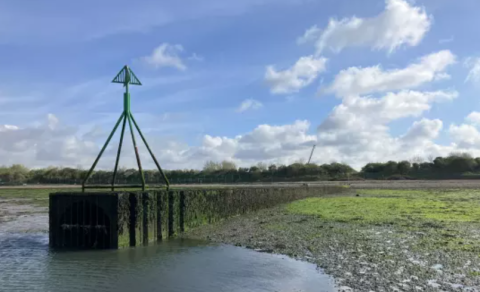

A University of Portsmouth scientist has helped raise the issue of PFAS pollution in Parliament
7 November 2024
9
A new bill that sets out legal limits for the use of a group of toxic chemicals known as PFAS has been introduced to the UK Government, following pressure from world-leading scientists - including from the University of Portsmouth.
Per- and polyfluoroalkyl substances (PFAS) are a complex group of nearly 15,000 synthetic substances used in consumer products around the world since the 1950s. They keep food from sticking to packaging or cookware, make clothes and carpets resistant to stains, and are found in firefighting foam. The so-called ‘forever chemicals’ - which some may recognise from the Hollywood movie ‘Dark Waters’ - don't break down easily in the environment. They have been linked to adverse effects on human health and wildlife.
Professor Alex Ford from the University of Portsmouth’s School of the Environment and Life Sciences and Institute of Marine Sciences, has been investigating the impact of the chemicals on marine environments for several years.
Last month, Professor Ford co-signed a letter to ministers with more than 50 other scientists from the UK and around the world, urging them to be more ambitious in their regulation of PFAS than the previous Government.
They warned the highly persistent group of chemicals show no evidence of degrading in the environment, and have been found across the world from the Arctic to Mount Everest. They have also been detected in people’s blood, drinking water and foods bought in supermarkets.
US lawmakers have already introduced a 'non-essential' PFAS ban bill, that would give manufacturers 10 years to phase out production of non-essential forever chemicals. Meanwhile, the EU is in the final stages of implementing a PFAS ban, which could cover over 10,000 different chemicals.
But the group of experts said the UK has adopted a ‘narrow definition’ of PFAS, which only includes a few hundred substances and excludes thousands more.
When announcing the PFAS forever chemical bill in Parliament on Tuesday (5th November), the Liberal Democrat MP for Twickenham, Munira Wilson, said: “When it comes to raw sewage spills, the Marine Conservation Society notes that there is no legal requirement for water companies to monitor for PFAS in sewer overflows. A study conducted by the University of Portsmouth found that following sewage discharges in Langstone harbour, the amount of one particular PFAS— perfluorobutanoic acid, or PFBA—in seaweed was more than 6,000 times higher than in the surrounding water.”
Munira's bill, which the Lib Dems say has received cross-party support, would introduce a statutory limit for PFAS concentration and require water companies to monitor and limit PFAS levels in drinking water supplies.
A study conducted by the University of Portsmouth found that following sewage discharges in Langstone harbour, the amount of one particular PFAS— perfluorobutanoic acid, or PFBA—in seaweed was more than 6,000 times higher than in the surrounding water.”
Munira Wilson, Liberal Democrat MP for Twickenham
“The cross party bill provides a golden opportunity for the new government to act, to act and stem the untold harm unleashed on our land, water and people”, she added. “To act and answer the calls of the hundreds of groups, the hundreds of thousands of citizens who are demanding action. Only last month, 59 of the world’s leading scientists wrote to the Government urging them to adopt a more ambitious approach in the regulation of PFAS, by regulating it as a group. Mr Speaker, surely it is time to listen.”
Recently, Professor Ford partnered with the UK's leading marine membership charity to investigate the presence of PFAS in a protected area on the south coast of England. The study revealed PFAS concentrations increased significantly after sewage discharges.
Wastewater treatment plants (WWTPs) are not effective at removing PFAS, and therefore they are often released into the environment through combined sewer overflows (CSOs).
The research focused on Langstone Harbour which is a Site of Special Scientific Interest (SSSI) and a Special Area of Conservation (SAC). The area is home to harbour seals and a diverse range of birds.
Samples showed the amount of one particular PFAS called Perfluorobutanoic acid (PFBA) in the seaweed was over 6000 times higher than the amount found in the surrounding water.
Following the introduction of the new bill, Professor Ford said: “We need a strong precautionary approach to dealing with PFAS chemicals. Some of our whales and dolphins are still suffering from chemical contaminants we were slow to ban three decades ago. PFAS chemicals are highly likely to be detectable in humans and wildlife for many generations to come.
“We owe it to our children and grandchildren not to leave them with this toxic legacy. I welcome the efforts of some members of parliament to help bring in stronger legislation to help regulate and ban these forever chemicals."
Professor Ford has spent over 20 years working as an environmental scientist with expertise in Marine Biology, Environmental Toxicology, Parasitology. Last year, he was named in a list of the top two per cent most cited scholars in the world, produced by Stanford University and Elsevier.
Earlier this year he was elected the first UK academic to serve on the Board of the International Panel on Chemical Pollution (IPCP). The IPCP provides a platform for experts across the world to inform regional and global guidance for science policy, helping to shape chemicals and waste management policies.
It has been estimated that pollution is responsible for 9 million premature deaths annually, and we are estimated to use several hundred thousand chemicals in our everyday lives, many of which are toxic to ourselves and wildlife.
More like this...
Portsmouth academics in top two per cent of researchers in the world
Over 40 academics from the University of Portsmouth are among the top two per cent of the most cited scholars in the world.
25 October 2023
6 min read

Portsmouth scientist elected to join International panel for chemical pollution
25 January 2024
6


Professor Alex Ford collecting samples for testing

